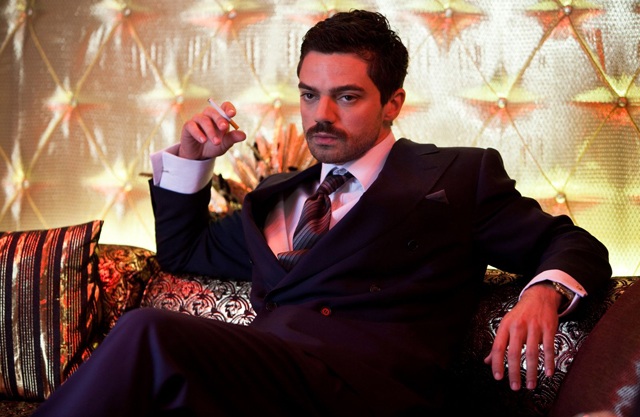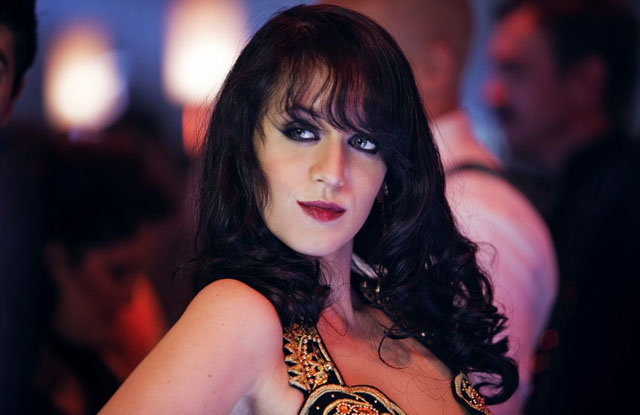CHICAGO – Patrick McDonald of HollywoodChicago.com appears on “The Morning Mess” with Dan Baker on WBGR-FM (Monroe, Wisconsin) on March 21st, 2024, reviewing the new streaming series “Manhunt” – based on the bestseller by James L. Swanson – currently streaming on Apple TV+.
‘The Devil’s Double’ Magnifies the Sorrows of Iraq
 Rating: 3.5/5.0 |
CHICAGO – There is evil all over the world, as long as there are human beings whose lust for power overcomes any semblance of morality. Iraq seems to be ground zero for those consequences, broken from within and invaded from the outside. It is the surreal tale of Saddam Hussein’s oldest son Uday that’s outlined in “The Devil’s Double.”
Dominic Cooper gives a raging performance as Uday Hussein, as well as portraying Hussein’s body double, Latif. The two characters are distinct and separate, and Cooper’s understanding of both is the highlight of the film. The story is based on the book by Latif Yahia, and showcases Uday as a sensationalistic pleasure seeker, a poisonous monster with a paranoid distrust of virtually everything, infiltrating every perceived enemy or simply using his false friends.
Latif is an effective Iraqi soldier as the film begins, who had attended the same school as Uday Hussein, eldest son of Saddam. He is summoned to the palace in Baghdad to fulfill a new role, that of body double for the heir apparent son. Latif refuses at first, but threats toward his family and torture finally allows him to capitulate. He goes through cosmetic surgery to get the look exactly right, and becomes part of Uday’s palace brotherhood.
 Photo credit: Sofie Van Mieghem for Lionsgate |
The job of Uday’s double means Latif goes on every dangerous mission the son won’t touch. In the meantime, Uday’s hedonistic lifestyle ranges from sleeping with whoever he wants, to indulging in cocaine and firearms. One of the women under the palace roof, Sarrab (Ludivine Sagnier), finds a connection with the double, and she figures into the next chapter of the Uday/Latif relationship, that of attempted escape and retribution.
Dominic Cooper absolutely makes this film, his ability to absorb both sides of the Uday story is an acting tour de force. His Uday is maniacal, with hardly a moral bone in this body. Latif, on the other hand, is a stone cold survivor, and Cooper imbues him with a stoic and steely nature that in many ways makes him as unpredictable as the dangerous Son of Saddam. One of the stronger scenes is when Latif first takes on the persona of Uday for an appearance. The switch is sharp and frightening, he literally got to play both of his characters in ten seconds.
The story is unrelenting and fairly sad. Uday fiddles while Iraq burns (during the period of the first Iraq War of the early 1990s), and the ruthlessness of he and his father Saddam is well on display. The twitchy nature of the son is redundant and weakens the narrative, as he flits from one atrocity to another. These sequences, coupled with the whoring and general carnage, provides a opportune platform for the argument of removing these uncivilized, so-called “leaders.” The situation might have had more resonance if there were some aspects of alternate behavior, to better contrast and emphasize the evil.
The always interesting Ludivine Sagnier (”Swimming Pool”) puts an unique spin on the character of palace party girl. It is sensual and off-putting, she acknowledges using the atmosphere for her own gain, but also is willing to acquiesce when up against the threat of Uday. She has such a unforgettable onscreen look, and is willing to be as dangerous as possible with it. There are no glossy star facades with Sagnier, and she adds a good amount of necessary female ardor to the thick patriarchal environment.
 Photo credit: Sofie Van Mieghem for Lionsgate |
If Uday was truly like his character in The Devil’s Double, then the world has lost nothing in his eventual execution by U.S. troops in 2003. It is just another reason to feel empathy for the sorrow of the Iraqi people, who apparently never had anyone looking out for them. In capturing the black heart of Uday and Saddam in this film, it is a wonder that the sun ever rises over the country, with darkness from inside their leaders matching wretchedly with perpetual war.
If there is a lesson from Uday Hussein, it is the one that defines the consequences of naked power lust. His personality was distilled down to pleasure seeking, raving lunacy and a taste for the kill. If anyone of us were put onto the top of a power chain, isolated and without regret, would or could the same thing happen to us?
 | By PATRICK McDONALD |


